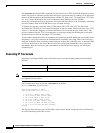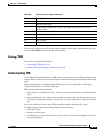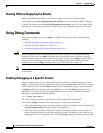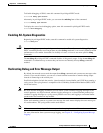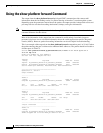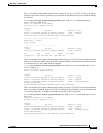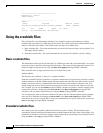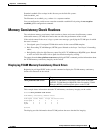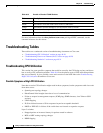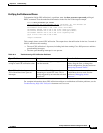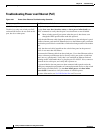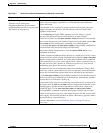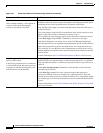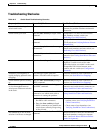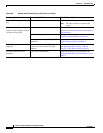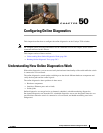
49-26
Catalyst 3750 Switch Software Configuration Guide
OL-8550-09
Chapter 49 Troubleshooting
Troubleshooting Tables
For more information about the show platform tcam errors privileged EXEC command, see the
command reference for this release.
Troubleshooting Tables
These tables are a condensed version of troubleshooting documents on Cisco.com.
• “Troubleshooting CPU Utilization” section on page 49-26
• “Troubleshooting Power over Ethernet (PoE)” section on page 49-28
• “Troubleshooting Stackwise” section on page 49-31
Troubleshooting CPU Utilization
This section lists some possible symptoms that could be caused by the CPU being too busy and shows
how to verify a CPU utilization problem. Table 49-4 lists the primary types of CPU utilization problems
that you can identify. It gives possible causes and corrective action with links to the Troubleshooting
High CPU Utilization document on Cisco.com.
Possible Symptoms of High CPU Utilization
Note that excessive CPU utilization might result in these symptoms, but the symptoms could also result
from other causes.
• Spanning tree topology changes
• EtherChannel links brought down due to loss of communication
• Failure to respond to management requests (ICMP ping, SNMP timeouts, slow Telnet or SSH
sessions)
• UDLD flapping
• IP SLAs failures because of SLAs responses beyond an acceptable threshold
• DHCP or IEEE 802.1x failures if the switch does not forward or respond to requests
Layer 3 switches:
• Dropped packets or increased latency for packets routed in software
• BGP or OSPF routing topology changes
• HSRP flapping
Table 49-3 Details of Checked TCAM Portions
Column Description
Values The number of invalid values found in the TCAM tables.
Masks The number of invalid masks found in the TCAM tables.
Fixups The number of initial attempts to fix the invalid values or masks.
Retries The number of attempts to fix the invalid values or masks.
Failures The number of failed attempts to fix the invalid values or masks.



